Sure you right. Russian-Polish relationship extremaly hard to name as friendly at this period. And certainly russians have the simular clames for the Poland as Poland for the USSR or Russia.
But i think it’s wrong way becouse it’s deadline. We must look to eash other from positive view…
Certainly you right AK was hostile for the Red armiy. And therefore i could not understand the plans of Londons poles to force comrade Stalin to play in their rules in august 1944.
It’s could be called as criminal naive.
Cheers.
Thanks mate about situation in Poland. Its interesting.
Certainly we understand that “Pilsudski wanted to take the control over this area” in reality this mean the polish imperialism ( like and soviet - i agree with you).
It wasn’t Pilsudski’s idea. Just a polish cultural myth, not even worth of discussion.
Mate let me tell you something about “polish cultural myth”.
As you correctly noted Pilsudskij had the strong rusofobic and anti-semitic points. Its not surpprised after the bolshevic atrosities in 1919-1922. And you right this situation made the Poland and Nazi Germany bu the friends. Lets recal some dates:
1933 - Nazi took the power and Poles immediately begin diplomatic relationship with them
jenuary 1934- was signed the German-Polish non-agression agreement ( like 1939 USSR-Germany agreement)
november 1935- was signed Polish-Germany economical agreement.
It was obviously for the all the world who became the new Polish friend. ( till 1939)
But nothing is surprised in 1935-38 Hitler , as it seemed for the manies the brilliant guy who could to beat the bolshevism and USSR. Even Britain tryed to direct the german agression to the East ( i.e. USSR) certainly via the Poland.
Apogee of the Polish- German friendship was the 1938.
When in 29-30 september of 1938 in Munich Chechoslovak’s govenment was forced the to sign the agreement which was the resault in of lost Chechoslovak independence.
The most surprised was the Poland who demand 1 october of 1938 the Theshin area.
http://ru.wikipedia.org/wiki/Мюнхенское_соглашение_1938_года
To understand to Polish-Germany agressive partnership prove the memours of executed Ribbentrop ( his wife published it in London in 1952)
see the Jasa post page above
http://www.ww2incolor.com/forum/showthread.php?t=3795&page=6
Ribbentrop about his consulations with Beck (Polish foreign minister) in early 1939:January 6, 1939, Warsaw.
I asked Beck whether they (the Polish government) have given up on the aspirations of Marshall Pilsudsky towards Ukraine. He answered, smilingly, that they have already been in Kiev once and that without a doubt such aspirations are still alive today.
Then I thanked Mister Beck for his invitation to visit Warsaw. The date has not been set yet. We’ve agreed that I and Mister Beck will yet again think through all the detals of the prospective treaty between us and Poland"
January 26, 1939, Warsaw.
… Then I spoke to mister Beck again regarding the policy of Poland and Germany towards the Soviet Union and in this relation about the question of Greater Ukraine; I again offered cooperation between Poland and and Germany in this respect.
Mister Beck admitted that Poland has aspirations regarding Soviet Ukraine and access to the Black see, he also pointed out to the dangers that a treaty between Poland and Germany directed against the Soviet Union would bring about. However, he, while speaking on the future of the Soviet Union, expressed an opinion that USSR will either fall apart as a result of an internal desintegration or, to avoid such an outcome, would gather its forces and strike first.
I pointed out to Mister Beck on the passive nature of his position and also stated that it would be reasonable to preempt the outcome that he is foretelling and attack the Soviet Union with a propaganda war. In my opnion, as I said, joining the Ani-Comintern pact Poland would gain since her security would be strengthened by getting in the same boat with us.
Mister Beck said that he will seriously consider this proposal.
So my friend you could call it as “polish cultural myth” but for the comride Stalin and USSR in 1938 Poland was very danger and hostile neighbour.
The whole tragedy ( or comedy) of situation was that …
While Poland builded its plans to have the soviet Ukarain with germans, Hitler come behind and … made it with Poland together with Stalin.
made it with Poland together with Stalin.
It was very danger to play with Hitler in equal conditions…
as it’s absolutly right wrote Egorca
Lets stop the our prejudices guys.
We, russians might stop the denie agressive bolshevics plans and you ,poles, might stop to picture the “innocent” Poland till the war .
If we will more honest for each other we’ll win.
Cheers.
Regaining of land which was taken by Russia in XVIII century is not a imperialism mate.
And as I said before there idea of “buffer” states, not one huge country.
In contradiction to Poland, Russia’s plan wasn’t to create any independent state between our countries.
Rusofobic is an exaggeration, it was strong fear of Russia’s ambitions.
After 124 years of russian occupation it was well-founded.
Pilsudski WAS NOT anti-semitic.
So let me recall you some dates:
April 16th 1922 - Rapallo cooperation agreement (also military) - Germany and Russia
April 16th 1926 - non-agression pact- Germany and Russia
So, who was the real friends then? 
You also forgot to add that besides non-agression pact with Germany, Poland signed exactly the same pact with Russia (July 25 th 1932), which was extended in 1934 for ten years.
So it doesn’t look like polish friendship with nazi Germany.
Especially when you recall the fact that it was Poland who proposed to France a preventive attack against Germany in 1935.
I’m not trying to protect the myths of great, innocent polish state, especially between world wars. I’m far from calling the polish agression against Czechoslovakia a justified act (so-called Zaolzie area). Franly speaking, I’m ashamed of that.
But please Chevan, don’t try to tell me that Poles were friends with Germans. If they did, they would accept German conditions just like Czechs did, for example.
It doesn’t mean that USSR was a friend of nazi Germany at that time. It wasn’t nazi before 1933 
Correct Lexa, but that cooperation wasn’t even suspended when Hitler became a chancellor. 
It lasted till June 22nd 1941.
The word “criminal” much better suits Stalin than the Polish government in London. What I can’t understand is why Stalin treated Poland in such way. One his “yes” to support the Warsaw Uprising could change much…
How could he really expect successful “sovietization” of Poland after all?
Hello,
Kovalski wrote:
Regaining of land which was taken by Russia in XVIII century is not a imperialism mate.
And Poland got it before that from Russians… let’s not get that far back in time here. Not because it does not matter, but simply because we will get lost in the time span.
So let me recall you some dates:
April 16th 1922 - Rapallo cooperation agreement (also military) - Germany and Russia
April 16th 1926 - non-agression pact- Germany and Russia
You are right. There was this agreement. But one of the reasons for it was that they both felt valnuarable to poland. Germany needed to do things they could not do in they own country (Germany was bound by Versaille treaty and USSR was not) and USSR got benefit of all the technical knowledge they obtained from Germans. And also remember that Germany was not Nazi that time. By the way this technical cooperation seized in middle of 1933 (not cooperation in general). Nice article in Russian: http://www.duel.ru/200650/?50_6_1
Here a short quote from the article:
“After the French occupation of Rhur region in Germany in January 1923 military preparations were on the way in Poland, where mobilisation of 800.000 reservists was conducted. … On 20 of January Polish minister of foreign affairs Skshinsky said: “If only France had called for joint actions, we undoubtedly agreed on it”. After that they talked with regret for long time that France did not agree on joint actions against Germany. …
On the 13th of January USSR made statement to the European governments: “The industrial heart of Germany occupied by foreign enslavers. German people received another heavy blow, and Europe is under dange of new violent international slaughter. In this critical moment our country of workers and peasants can not be silent”.”
I see the situation in such way that USSR and Germany were allied (or rather had to hold together) because they both felt (reasonably or not is another question) danger from Poland.
Actually Germany was more or less the only possible ally of USSR in Europe. It was actually inevitable that these two should have cooperation. Just like others did (France, Poland, Romania).
In this light see how others (neither Poles nor Russians) would describe the situation. Here is extract from the work “History of Nations” volume 4, editor Erik Møller, printed in Copenhagen in 1937. Translation from Danish to English is mine.
On the pages 476 – 478 it says:
[i]Chapter title: The new republic
Temporally the borders of the new state (Poland – my comment. Egorka) were not defined, and Poles got quickly involved in struggle for the disputed areas. In the West with Germans and Chzecks, in the East with Ukrainians and Bolsheviks. During the Paris conference (from 18.01.1919 till 20.01.1920 – my comment. Egorka) Poland was quickly recognised as an independent Republic and Versailles treaty determined it’s borders in the West: Poland got all what could be defined ethnically as polish. This includes West-Prussia, Poznan, West-Galicia og in the mixed region voting took palce (f.ex. in Upper-Schelesia). To give Poland access to the sea, Danzig was made into a free town with polish full right to use it a sea port. Thus Poland become an independent state, but the disputes about it’s eastern borders were not settled. The Bolsheviks spreading towards the west and relationship with Lithuania and Ukraine still held some problems. Pilsudski was persuaded to form a union state consisting of these countries and Poland (Międzymorze = “between seas” - my comment. Egorka), therefore in the spring 1920 he started a campaign against Bolsheviks and reached all the way to Kiev. A well organised offensive from the Red Army drove Poles temporally back, and in the Summer even Warszawa was in danger. With a brilliant counter offensive, led by French general Weygand, was enemies advance stopped, and in the fall polish and Russian delegations met in Riga to negotiate the peace conditions.
The treaty (Riga treaty – my comment. Egorka) was signed in 1921. It recognized Polish ownership over East-Galicia and moved the whole border further to the East, than the polish population was reached. Under the fight against Bolsheviks, Vilna was also occupied (by Poles – my comment. Egorka), this town Lithuanians had also demand for. Population in the town itself and the area is very mixed, with undoubtedly strong polish presents. But after the negotiations between allies, in December 1919, decision was made to give Vilna to Lithuania. During the military campaign in 1920 Vilna was lost to Bolsheviks, who gave it to Lithuanians after Bolsheviks acknowledged Lithuania’s independence with the peace treaty on 9th of July 1920.
When Poles pushed forward, they occupied Vilna in October 1920 by general Zeligkovski, and Poles denied to give the town back. Being helpless over their stronger neighbour, Lithuania addressed League of Nations. After long time and a lot of difficulties negotiations ended with result that Ambassador conference in March 1923 gave Vilna to Poland. Since then the relationship between Poland Lithuania has never been good.
The most important alliances Poland sleeked with France and Romania (remember Polish government fled to Romania – my comment. Egorka). With this poles hopped to countermeasure the threat both from USSR and Germany.
[/i]
Please note the year this was written. Please also note that it is clear this is not a pro Russian article.
Best regards
Igor Korenev
Hi Igor,
Very good post. I’m very happy that we can communicate in the same language… (I mean mental attitude…)
One exception. Warsaw counter offensive plan was not conceived by gen. Weygand … nor by “genius” Pilsudski, but by gen. Rozwadowski…
Rozwadowski was, (because of it), not really favourite Pilsudski’s general…
I would like to point some other important factors:
- Co-operation of Pilsudski with Petlura. Apparently Pilsudski wanted independent Ukrainian state as a buffer between soviet Russia and Poland.
Effectively Pilsudski betrayed Petlura and Ukrainians. Signing Riga Treaty ended any Ukrainians hopes for an independent state.
This was a main reason for unstable, volatile situation in Eastern Poland-West Ukraine between 1922- 1939.
To control the situation, Poland created KOP, (Border Defence Corps), which main task was the suppression of Ukrainian discontent.
Pacifications of Ukrainian villages by KOP can be counted as a “dark area of Polish history”…
As we can talk here freely, I can say that what I’m saying here, right now, will hopefully help to form understanding, bond and finally friendship between Russian, Ukrainian and Polish people.
Cheers,
Lancer44
Well are you sure those “Buffer” states will be really independent. I’ am not.
If those buffer state must be created by the offencive of Polish army like in 1919-20 in Ukraine.
Rusofobic is an exaggeration, it was strong fear of Russia’s ambitions.
After 124 years of russian occupation it was well-founded.
Mate you will laugh … … but Rusofobia LITERALY mean ( from Latin) “Fear of russains” ( not Hate to the Russians)
… but Rusofobia LITERALY mean ( from Latin) “Fear of russains” ( not Hate to the Russians)
But i agree with you the occupation of Poland by the Czar Russia was big mistake. But this is not the argument why we must remember it forever and avenge to each other today.
Pilsudski WAS NOT anti-semitic.
Well you right my typo 
During Pilsudski 1925-1935 polish anti-semitism went down. But after his death arise again.
Here’s you incorrect mate. After Nazi’s coming to power in 1933 Soviet-German war and engenering partnership come to the end till 1939. All germans war specialists and officer which being in the USSR since 1926 come back to the Germany till 1934.
The reason is obvious my friend.
The Hitler’s ideology against jewish bolshevism i.e. DIRECTLY USSR.
And this is why Poland begin the relations with Nazi in 1934 - they bacome the obvious forced allies against USSR. And polish anti-semitism played its role.
You also forgot to add that besides non-agression pact with Germany, Poland signed exactly the same pact with Russia (July 25 th 1932), which was extended in 1934 for ten years.
But in this way why Polish foreign minister Beck didn’t go to the Moscow and discuss with Molotov plans agains Germany?
Why was Polish-NaziGermans diplomatic reletionship so close till 1939?
Especially when you recall the fact that it was Poland who proposed to France a preventive attack against Germany in 1935.
I don’t know what fact do you mean. But in 1935 was signed just one inportaint international agreement WHICH really could stop the Germann agression plans to the East.
16.05.1935 USSR-France-Cheshoslovac anti-german’s agressions agreement ( whit condition if Germany attacked the Chec).
And if France refused this agreement later in 1938 (in Munich) than USSR WAS THE SINGLE STATE WHICH defenced Checoslovac side. And USSR expressed the official note of protest (becouse Stalin clearly understood what’s the division of Chechoslovacia did REALLY MEAN).
So where was the Poland?
Poland meet the Pibbentrop and expanded its own territory;)…
I’m not trying to protect the myths of great, innocent polish state, especially between world wars. I’m far from calling the polish agression against Czechoslovakia a justified act (so-called Zaolzie area). Franly speaking, I’m ashamed of that.
But please Chevan, don’t try to tell me that Poles were friends with Germans. If they did, they would accept German conditions just like Czechs did, for example
Mate sure you right Poland wasn’t frienf of Germany. I just use the metaphora and a little sarcasm…
But honestly speaking i understand your point.
Cheers.
Well are you sure those “Buffer” states will be really independent. I’ am not.
If those buffer state must be created by the offencive of Polish army like in 1919-20 in Ukraine.
They were planned to be really independent. For example the idea of independent Ukraine fell through during the peace talks in Riga in 1921.
Poland couldn’t support Semon Petlura any longer for few reasons:
- Poland’s economical and military resources were exausted - Poles could fight for Ukrainians any longer;
- Semen Petlura didn’t manage to gain support of Ukrainians (what made him an unreliable poltician);
- some of polish right wing politicians were afraid of consequences of raising of ukrainian state - possible alliance with Germany, attempts for borders’ revision.
Personally, I believe that creation of puppet government (pro-polish) in Ukraine would fail immediately due to bad polish-ukrainian relations.
Mate you will laugh …
… but Rusofobia LITERALY mean ( from Latin) “Fear of russains” ( not Hate to the Russians)
But i agree with you the occupation of Poland by the Czar Russia was big mistake. But this is not the argument why we must remember it forever and avenge to each other today.
Of course you’re right. 
Well, I should make myself clear. The word “rusofobic” had a very negative meaning in Poland. It has a very emotional tone - almost histerical.
So I meant that Pilsudski was afraid and aware of russia’s ambitions, but he wasn’t reacting histerically. 
Here’s you incorrect mate. After Nazi’s coming to power in 1933 Soviet-German war and engenering partnership come to the end till 1939. All germans war specialists and officer which being in the USSR since 1926 come back to the Germany till 1934.
You’re right. Military and technical cooperation was stopped after 1933.
The reason is obvious my friend.
The Hitler’s ideology against jewish bolshevism i.e. DIRECTLY USSR.
But this ideology wasn’t an obstacle for Nazis nor Soviets to cooperate - examples:
- 12th of January 1939 - Hitler meets soviet ambassador Aleksjey Mieriekalov. Few days later all anti-soviet slogans dissapeared from nazi propaganda. Bolscheviks turned out to be friends of Nazis.
- 10th of March 1939 - Stalin in his speech accuses France and Great Britain, that they attempt to implement a conflict in german-soviet relations, when there were no conflict between these two states in the past.
And of course the final - 23rd of August 1939 - we all know what pact was signed.
And this is why Poland begin the relations with Nazi in 1934 - they bacome the obvious forced allies against USSR. And polish anti-semitism played its role.
Non-agression pact is not an act signed between allies, Chevan. It is really unbelievable that Poland, which in Hitler’s opinion didn’t deserve to exist, suddenly became an ally of Nazi Germany. Signing of this pact was a success of polish diplomacy, but just a illusory success. As Jozef Pilsudski said then:
“Poland is now sitting on two stools. It cannot last for long. We need to know which one we will fall off first and when.”
But in this way why Polish foreign minister Beck didn’t go to the Moscow and discuss with Molotov plans agains Germany?
Why was Polish-NaziGermans diplomatic reletionship so close till 1939?
What “close relations” Chevan?
Could you write something more?
I don’t know what fact do you mean.
Pilsudski planned an attack on Germany (after the non-agression pact with Russia was signed in 1932), because he realised that France and Great Britain are not going to react on German attack against Eastern Europe. The emissary who was sent to Paris, came back with nothing because the French refuse to attack Germans from the West.
They were planned to be really independent. For example the idea of independent Ukraine fell through during the peace talks in Riga in 1921.
Poland couldn’t support Semon Petlura any longer for few reasons:
- Poland’s economical and military resources were exausted - Poles could fight for Ukrainians any longer;
- Semen Petlura didn’t manage to gain support of Ukrainians (what made him an unreliable poltician);
- some of polish right wing politicians were afraid of consequences of raising of ukrainian state - possible alliance with Germany, attempts for borders’ revision.
Personally, I believe that creation of puppet government (pro-polish) in Ukraine would fail immediately due to bad polish-ukrainian relations.
OK. I knew a little about Polish-Ukranian relations in this period.
But this ideology wasn’t an obstacle for Nazis nor Soviets to cooperate - examples:
- 12th of January 1939 - Hitler meets soviet ambassador Aleksjey Mieriekalov. Few days later all anti-soviet slogans dissapeared from nazi propaganda. Bolscheviks turned out to be friends of Nazis.
- 10th of March 1939 - Stalin in his speech accuses France and Great Britain, that they attempt to implement a conflict in german-soviet relations, when there were no conflict between these two states in the past.
And of course the final - 23rd of August 1939 - we all know what pact was signed.
That’s right mate.
One of the amazing thing in the 20centure history - how could soviet jewish gov was able to agree with nazi in 1939.This was becouce of very serious reason for each side.
Bolshevics looking how easy and quick so called western democracy France and Britain presented the Chech lands to the Hitler were very trouble. From the view of perspectives of future world war they were afraid to be in political isolation i.e. one to one with Fascist Europe. After the absorbtion of high industry Chechoslovakia the economical power of Germany increased in twice. In the spring of 1939 it was clear that Britain didn’t wish to sign the anti-german war agremment with USSR.
As you may be know in 1936 between Nazi and Japan ( and later Italy) was signed so called Anticomminter pact agains bolshevism i.e. USSR.
-24.02.1939 Hungary signed Anticommintern pact
-7.04.1939 Spain joined to the Pact.
Britain could stop the german agression to the East but why they did it?
16.05.2006 Joined British staff of generals recommend to the Chemberlen to sing Soviet-Britain military agreement. But Chemberlen and Galifax fefuse it.
Instead of Britain and France senden to the Moscow 12 aug 1939 the delegations which were not authorized to sign any international agreement.
The time is went out.
6 aipril 1939 was signed the Britain-France-Poland war assistent agreement.
But as you already know my friend already, France and Britain indeed didn’t intend to send the help for the Poland( see France -Britain talks about possible war assistence against Germany 27.03.1939.Poland even didn’t considered as possible ally).
Now look to the whole political picture before 1 sep 1939. As it was absolutly clear for the appearance the power anti-soviet alliance in Europe. Moreover in Far East in 11 may 1939 began the soviet-japan war conflict (Halkingol). It was the critical situation for the USSR.
Athough it sound cynically but soviet-german agreement saved the USSR (not from the invasion but let to win the war). Becouse this let to involve to the war France and Britain against Germany till 22 june 1941. Besides Japane after 1939 was insulted by the Hitler
for the betrayal of anti-commintern pact. And instead of common attack to the USSR in 1941 Japan chosed the “south direction” and involved USA to the war against Germany. Thus in the end of 1941 appeared the strong anti-german coalitions USA-Britain-USSR which let us to win the war.
So my frient although i never considered bolshevic gov as “russians” but i have nothing agains them in august 1939. They did what they must did.
Non-agression pact is not an act signed between allies, Chevan. It is really unbelievable that Poland, which in Hitler’s opinion didn’t deserve to exist, suddenly became an ally of Nazi Germany. Signing of this pact was a success of polish diplomacy, but just a illusory success. As Jozef Pilsudski said then:
“Poland is now sitting on two stools. It cannot last for long. We need to know which one we will fall off first and when.”
I agree. non-agression pact don’t mean the war alliance. But it’s strange why some voices
( mostly from Poland) try to represent USSR-German non-agression pact as allias assigment?
What “close relations” Chevan?
Could you write something more?
I mean the meetings Beck with Hitler and Ribbentrop which was at least 3 times only during summer of 1939. Why nobody from polish gov didn’t travel tot the Moscow and discussed with Stalin the polish-soviet relationship so detail and intensive like polish-german. You may to agree that from the Soviet side it look suspiciously.
Pilsudski planned an attack on Germany (after the non-agression pact with Russia was signed in 1932), because he realised that France and Great Britain are not going to react on German attack against Eastern Europe. The emissary who was sent to Paris, came back with nothing because the French refuse to attack Germans from the West.
So why did Poland changed its point later in 1938. Why when polish saw as Britain and France didn’t wish to stop the Germany in the East ( and even they directed the Hitler to the East) Poland refuse any polish-soviet war partnership. Why France in 1935 signed the Soviet-France agreement against German but Poland refused it.?
Thanks for the information. Now I know what I was looking for.
Hello,
I would like to share something I lately have read, that might be interesting to what has been discussed in this thread so far (actually we got a bit away from the topic  ).
).
The info is from the work by V.Zaicev “Antiledokol” (http://militera.lib.ru/research/zaitsev/index.html). In the 7th chapter “Polish impasse” he writes that, in January 1933 Jozef Beck, being a special invoye of dictator Pilsudsky, delivered to Paris proposal for preventive war of England, France and Poland against militarising Germany. The french foreign ministry concidered this as a provocation and let out some of the compromising materials about Mr.Beck into press.
The interesting about this is that, already in January 1934 the German-Polish Non-Aggression Pact was signed. (USSR agreement was sisgned in July 1933)
Best regards
Igor Korenev
I bet the Polish did not want to fight for the Russians after they invaded them.
Back to topic.
Few pic Polish Army on Soviet command.
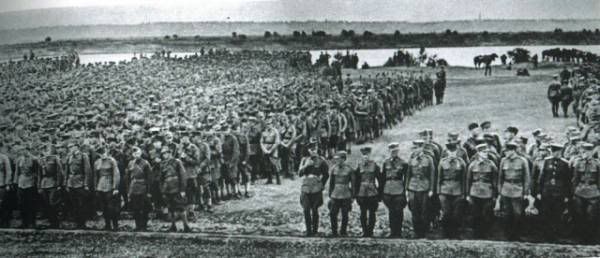
1st Inf. Div. “Tadeusza Kosciuszki” in 1943
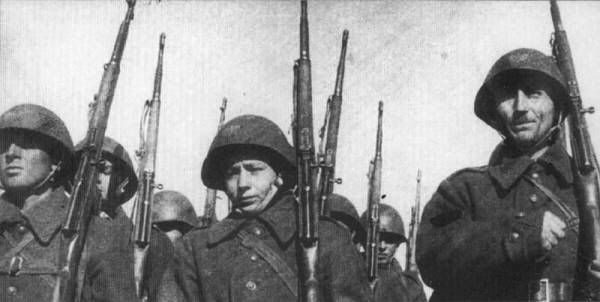
Volunteers of 1st Division
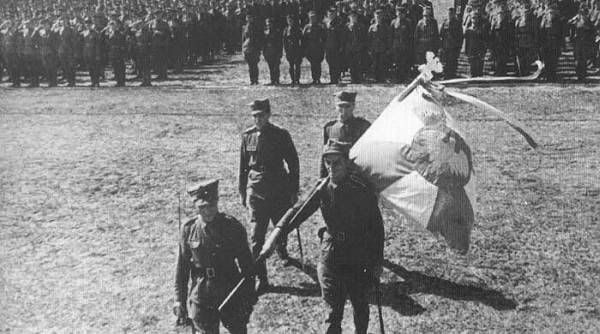
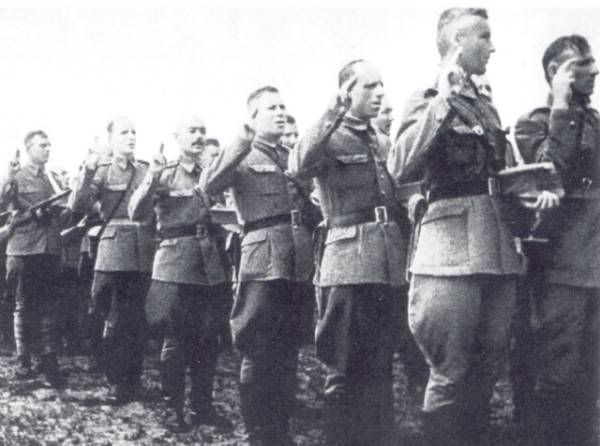
Oath 1st Infantry Division, 1943
Way nice photo Polar , thanks, i’ve never see the simular;)
You like them 
I have moore
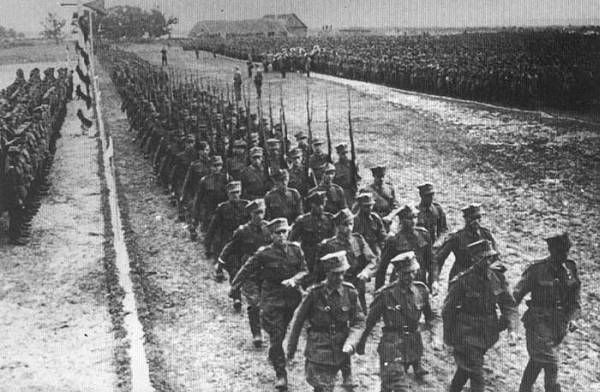
parade of soldiers of 1st Division, 1943
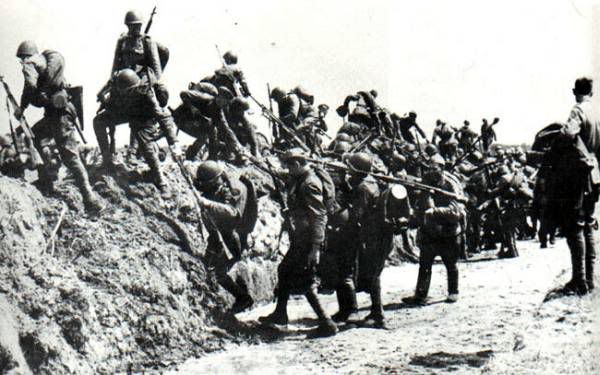
Soldiers of 1 Inf. Div. during exercises in 1943

Tank from 1st Tank Regiment
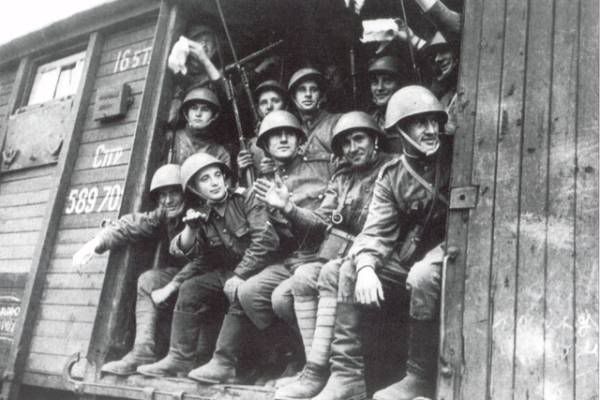
Soldier from 1st Infantry Division in travel in front
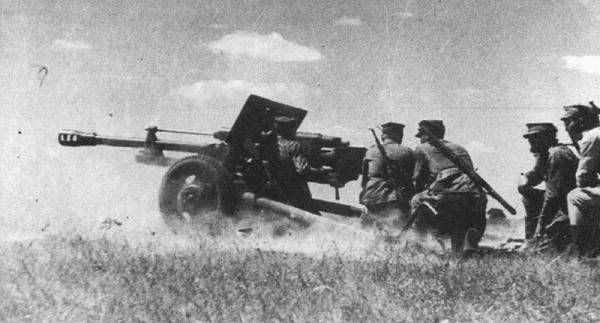
Light artillery engaging targets, outside Warsaw
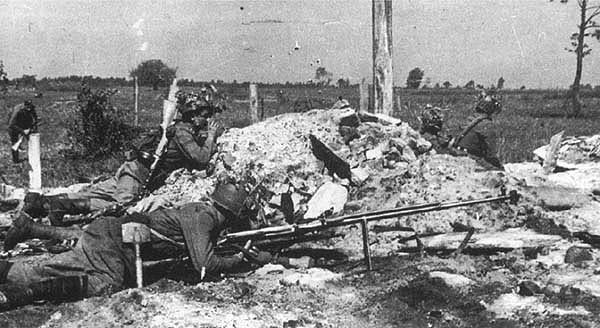
Polish position near Warsaw (Anin)
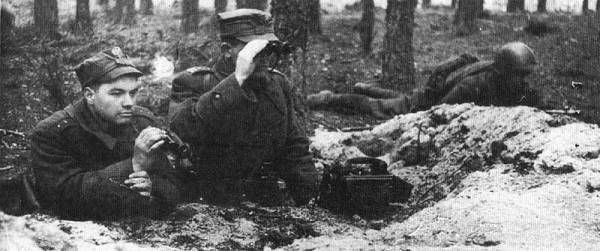
Commanding field position during fight for “Pommernstellung”.
You like them
Oh yea 
I like to see at the “poor” polish soldiers under soviets occupant command.
They look so “unhappy”  unlike the Home Army ( Крайовой)
unlike the Home Army ( Крайовой)
Cheers.
P.S. Indee i/ve nerer saw the mass of polish troops fighting together with Red army before. Except the favorite film of my childhood “for tankers and dog” 
